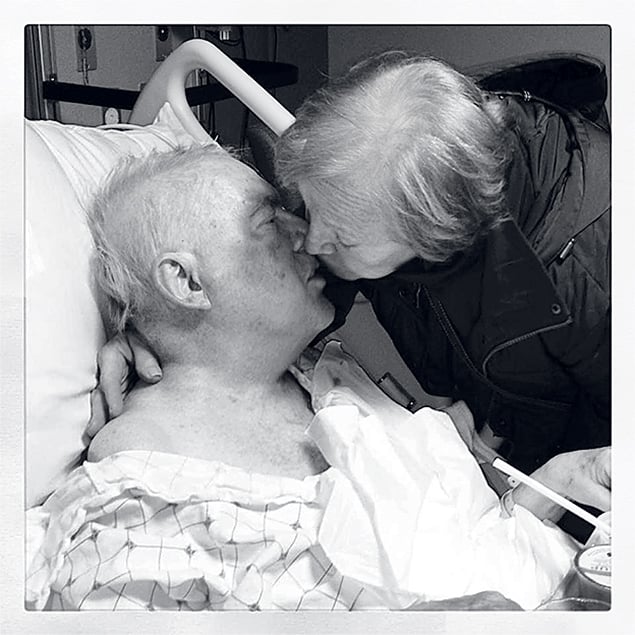My husband, Benjamin, and I were married 46 years, and I thought I knew everything about him. But soon after he died, I discovered he had secrets.
Well, one in particular.
Benjamin, you see, had set up our joint e-mail account. One day last year, I got locked out. Unable to sign in, I contacted Verizon. My conversation with the online help desk didn’t begin well:
“How can I help you, mr.b.milk?”
“I am not Mr. B. Milk. I am his widow. He just died, and I can’t get into our e-mail account.”
“So sorry for your loss, mr.b.milk.”
“No. I am not Mr. Milk. He died.”
“Can you answer your secret question, mr.b.milk, and then we can access your account? What was the first school you attended?”
I had no idea what elementary school Benjamin attended. Somehow, in more than four decades together, the name hadn’t come up.
I took a guess it was named for his hometown. Was it Woodmere Elementary?
No luck.
Eventually, I hired an online computer consultant who, for $149.99, “scrubbed” my iMac. I then obtained a new password and secret question. I never found out the school name but did, in the end, make it back into the e-mail account.
It felt like the story of my new life: I didn’t know the answer to the secret question. I didn’t even know the secret question. And Benjamin, who had shared so many actually important secrets with me, hadn’t left a lot of clues about the little ones, the passwords and investment-account fine print and credit-card-title details you need to know about to navigate the mounds of paperwork and bureaucracy precipitated by a spouse’s death—the stuff that seems too puny to talk about. Until you actually need to.
Benjamin’s illness hit us like a lightning strike. At age 75, he seemed remarkably healthy, with a head of silver hair and a boyish, slender frame that friends envied. He was chairing a meeting of our condo board in Rockville when he noticed he was having trouble with words and his right hand was trembling.
That night, the trembles continued. I thought he was having a stroke and called 911. He passed the EMTs’ stroke test, but we decided to have him transported to the Shady Grove Adventist emergency room anyway.
My daughter, Meredith, met us at Shady Grove. She’s a special-education teacher in Montgomery County. While Benjamin was being examined, Meredith recognized that he was having a seizure. A CT scan revealed a small mass in his brain.
I called my son, Jeremy, who lives in California; he arrived the next day. Benjamin, being Benjamin, apologized for messing up everybody’s weekend.
Benjamin and I had met at a party in New York in 1967 and married less than a year later. We moved to Washington in 1972 when he got a job at the Securities and Exchange Commission.
There can only be one drama queen in a family, and that was definitely me. Benjamin was the quiet, steady, analytical one—the ballast that kept our family sailing smoothly. Our life together was like one of the painting projects we occasionally tackled. I’d start in a whirlwind of activity—taping walls, pouring out paint, brandishing my roller, and demanding that Benjamin “get cracking.” Before long, I’d announce that I was exhausted and he’d finish the job.
We had a successful division of labor on other fronts, too. I spent the money; he paid the bills.
Benjamin amassed piles of papers at work and at home. When he retired from his job as vice president of the International Association of Refrigerated Warehouses, it took months to clean off his desk.

After he was diagnosed with one of the most deadly forms of brain cancer, glioblastoma multiforme, he tried valiantly to get his papers in order. He even pulled together all of his passwords—a dozen different ones to foil identity thieves. He put them in an e-mail in our joint Verizon account. But neither of us thought to share the answers to the secret questions that these days are the “open sesame” to banking, credit, and online accounts.
I didn’t push him on the paperwork. I thought we had plenty of time—the tumor was so small, and he seemed strong enough to fight it.
Even after he began to fail, I dealt with our finances as if it were a temporary assignment. I created a file for “bills paid by Leslie” and reported back to Benjamin so he’d be ready to take over again. He never did.
The conventional wisdom dispensed to grieving widows is not to make major decisions for a year. What they don’t tell you is you’ll be too busy dealing with the minor ones.
Take those passwords Benjamin had so thoughtfully kept for me in an e-mail, the ones that were supposed to confound identity thieves. They also confounded me. After he died—and after I hired the computer consultant to get me back into our e-mail account—I spent weeks combing through the account in search of the magical message. Maybe he was still trying to flummox the bad guys, but Benjamin had somehow decided not to give the e-mail a title that would be easy to find. Like, say, “passwords.” Eventually, I found the passwords in a message labeled “numbers rev.”
The early days were filled with unpleasant surprises. Having realized I had to take charge of my own finances sooner rather than later, I called GEICO to notify it of Benjamin’s death. The company immediately raised my automobile-insurance rate.
I was a greater insurance risk, it was explained to me, than when I was part of a couple sharing one car.
Soon after, I called Citibank. It promptly canceled my credit card.
It turned out Benjamin was the “owner” and I was merely a “user.” The bank representative explained that as a user I wasn’t required to pay the outstanding bill, and if I overpaid, I wouldn’t be entitled to a refund. If I didn’t pay the bill, they’d take it up with Benjamin’s estate.
Because I’m the representative of the estate, I paid the bill.
I can imagine that if I’d died first, Benjamin would have been barred from his beloved Costco. He had a card, but the membership is in my name.
Before long, I stopped trying to explain my situation to customer-service reps. I didn’t want one more anonymous voice explaining there was “nothing personal” about the cavalier treatment I got.
Shortly after I told PNC Bank of Benjamin’s death, our online bill pay for our joint checking account mysteriously failed. Given my previous Citibank experience, I didn’t question it. I just withdrew the balance and put it in another bank.
You can get away with keeping Costco and credit-card issuers in the dark about a spouse’s death. As long as you pay the bill on time, they don’t care about the signature on the check. But some notifications are legally required. I did have to file Benjamin’s will with Montgomery County.
Our will was so old it was embarrassing. It contained provisions for guardianship of our two children, who now are grownups and have children of their own. Like many couples, we thought we had lots of time to arrange our financial affairs.
The seemingly minor detail that slipped through the cracks turned out to be a problem.
Benjamin and I had designated each other as beneficiaries on our IRAs and shared ownership of our home. But my husband had one small investment account without a beneficiary. That sent me back to the courthouse to set up an estate that was subject to probate.
It’s not uncommon for couples to leave an asset or two in only one name and become subject to estate tax, the registrar of wills representative explained. Usually it’s a car.
I was lucky Benjamin wasn’t a more successful investor. Because his account held less than $50,000, it was considered a small estate under Maryland law and was probated quickly.
As part of the probate process, the estate was “advertised” with a legal notice in a local paper. Within days, I received a call from a man claiming to be from a Delaware law firm representing Benjamin’s creditors. I told him to put his claim in writing, and I never heard from him again.
I’ve since learned that some unscrupulous people check obituaries and immediately apply for credit cards in the name of the deceased. Luckily, my son had notified the three major credit agencies right after Benjamin died so nobody could claim his identity. Too bad I couldn’t use a phantom Benjamin to lower my car-insurance rate.
The death of a spouse is devastating. I’ve become an expert on waterproof mascara and learned it’s okay to cry in public places—that’s why God invented sunglasses. But when I look back on the 12 months since Benjamin’s death, I’m aware it has had elements of black comedy, too.
In the past year, I’ve spoken with others who have lost family members, and I’ve discovered I wasn’t alone in how my accounts were handled by banks and other companies. Some widows and widowers chose to continue to pay bills without notifying companies of their changed status. Others recounted painful and protracted bureaucratic tangles as the price for their honesty.
“Get at least a dozen death certificates,” they advised.
What have I learned from my own experience and research? Finalize financial plans before you need them. If you share a life, share ownership of all assets, your passwords, and the answers to your secret questions. Better to discuss them with your spouse than to do so with the Verizon automaton who calls you “mr.b.milk.”
I’ve also learned it’s okay to put off for tomorrow some things you can do today. Benjamin had a coin collection as a kid. I’ve found coins in boxes, in file folders, and in drawers. Eventually I’ll have to get them valued, save some for the grandchildren, and sell the rest. But they don’t take up much room, so I’ve put them aside. I’ve also delayed decisions about old photos of people I can’t identify and Benjamin’s parents’ high-school diplomas, scrapbooks, and letters to each other.
Then there are the artifacts from Milk’s Department Store, founded by Benjamin’s grandfather, who was mentioned in the movie about Benjamin’s cousin, gay-rights activist Harvey Milk. I’ve tried to donate the stern portrait of Morris Milk to the Harvey Milk Foundation so he can stop staring down at me from the guest-room wall. They told me to take a picture of the picture and send that. So Morris and I are still living together.
I like to think Benjamin would be proud of the way I’ve handled matters in the past year. I’m doing things differently than he did—I’ve shredded receipts he kept for decades. But he’d be happy to know that paying the bills makes me more aware of how much I spend at Target and Nordstrom Rack.
I’ve come to accept that Benjamin’s name is still on a fair amount of the correspondence that arrives at our house. I’ve learned the hard way that, as long as you don’t mind getting mail and messages in your spouse’s name, you don’t have to notify every commercial entity that you’re no longer a couple.
“Never tell E-ZPass,” a friend advised. “They say you can keep your transponder, but you’ll have to apply for a new account.” After all of my experiences dealing with companies, I’ve decided to keep my E-ZPass as is. Besides, I like the idea that wherever I go, Benjamin is along for the ride.
Lifestyle editor Leslie Millk can be reached at lmilk@washingtonian.com.
This article appears in our June 2015 issue of Washingtonian.



















